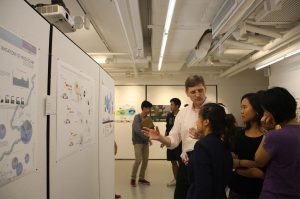Course Pedagogy
 The teaching in CCHU9001 makes use of the students own personal experience as a lens through which to understand and engage in board global and territorial issues relating to sustainable forms of living.
The teaching in CCHU9001 makes use of the students own personal experience as a lens through which to understand and engage in board global and territorial issues relating to sustainable forms of living.
The teaching comprises a series of short technical lectures (embedded with a wide variety of in class activities e.g. quizzes, discussions, votes, debates, etc.) that introduce key topics at global, territorial and personal scales. Weekly tutorial sessions allow students to explore these topics in discussion and to develop and test their own ideas relating to them. A workshop and final presentation allows students to present and articulate their own proposals, learning in the process from each other’s experience.
The lectures are in three broad areas. An introductory lecture looks at common definitions of sustainability and how people have envisioned sustainable communities throughout history. In the second session the class is introduced to the core issue of population and settlement, and examines how this underpins all other considerations about sustainability.
There follows four sessions relating to material resources, (materials & stuff, water, food and energy). Students look at the complete life cycle of material sourcing, production, distribution, consumption, waste and recycling, and discuss how much of this process is unknown to consumers.
The last four lecture sessions look at systems related to sustainable development (Transportation & Mobility, Communication & Technology, Health & Environment, and Community & Governance), and how these determine the level of resource consumption.
Coursework assignments are designed primarily as teaching tools, and comprise: a set of reading responses (one of which has to be submitted in audio form) which allow selected topics to be examined and discussed in more depth; and then two group projects which relate the sustainability topics to the student’s own lives. The first gets them to understand the scale of the issue on a personal level, and the second to formulate a proposal to address the issue at a district level.
